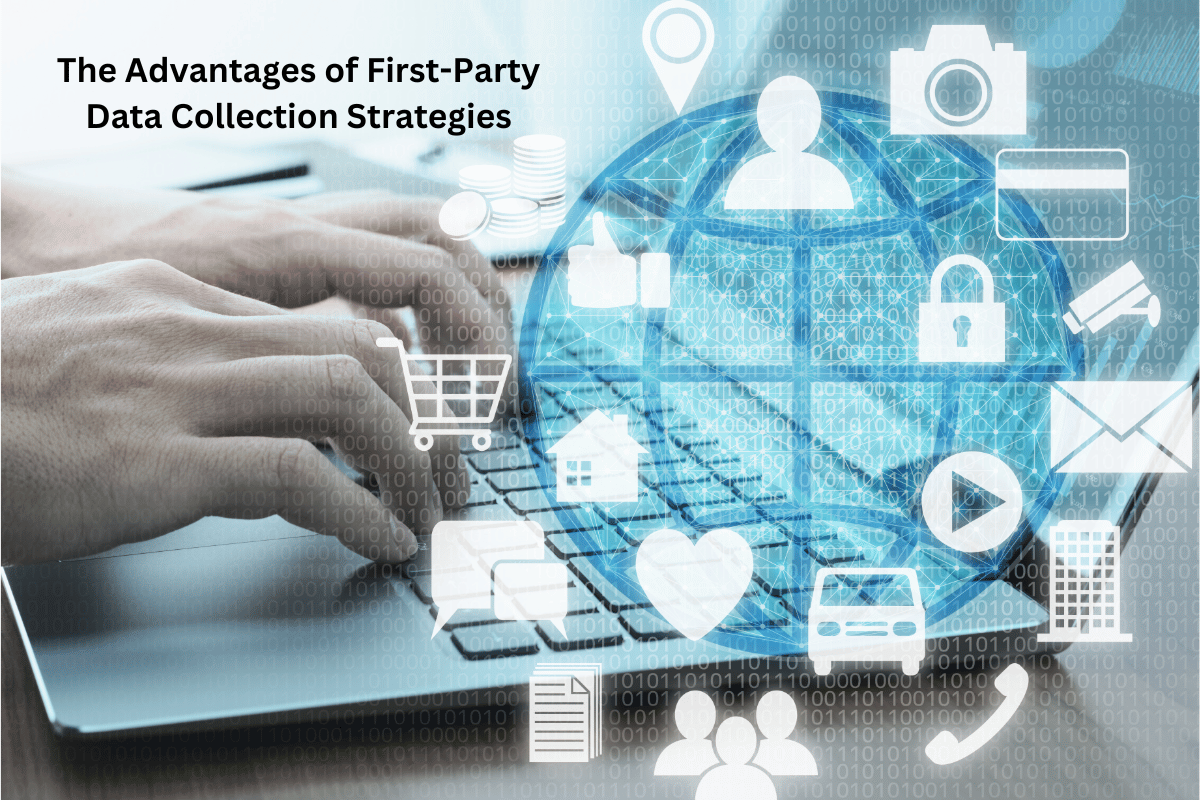The Advantages of First-Party Data Collection Strategies
First-party data collection strategies bring advantages like enhanced personalization, improved customer insights, and targeted marketing campaigns. By analyzing customer behavior and tailoring offerings, businesses can make data-driven decisions for success. These strategies also enhance data security through encryption and restricted access, building customer trust and avoiding breaches. Higher ROI and cost efficiency are achievable through personalized experiences and operational streamlining. The strategic use of first-party data not only boosts profitability but also helps in strengthening reputation and customer relationships. Understanding these benefits can lead to significant enhancements in business performance.
Key Takeaways
- Enhanced personalization through tailored user experiences and customized recommendations.
- Improved customer insights by analyzing behavior patterns and making data-driven decisions.
- Better targeted marketing campaigns with precise audience segmentation and personalized content delivery.
- Enhanced audience segmentation for increased engagement and improved ROI.
- Personalized content delivery with tailored recommendations and data-driven engagement.
Enhanced Personalization
Enhanced personalization in first-party data collection involves tailoring individual user experiences based on specific preferences and behaviors. By leveraging customized recommendations and essential tracking, companies can create a more engaging and relevant user experience.
Customized recommendations are generated by analyzing user behavior, such as past purchases or website interactions, to suggest products or content that align with their interests. This level of personalization not only enhances user satisfaction but also increases the likelihood of conversion.
Behavioral tracking plays a vital role in understanding user preferences. By monitoring how users interact with a website or app, businesses can gain valuable insights into individual preferences and behaviors. This data can then be used to create individualized messaging that resonates with each user on a personal level.
Improved Customer Insights
By delving deeper into customer data analytics, businesses can uncover valuable insights that inform strategic decision-making and enhance overall operational efficiency. This deeper understanding is essential for businesses aiming to stay competitive in today’s market.
Here are four key ways in which improved customer insights can benefit businesses:
- Behavioral Analytics: By analyzing customer behavior, businesses can identify patterns and trends that provide valuable information on how customers interact with their products or services.
- Customer Preferences: Understanding customer preferences allows businesses to tailor their offerings to better meet the needs and desires of their target audience.
- Data-Driven Decisions: With insights derived from customer data, businesses can make informed decisions based on facts rather than assumptions, leading to more successful outcomes.
- Enhanced Customer Retention: By understanding customer behavior, businesses can proactively address issues, improve customer satisfaction, and ultimately enhance customer loyalty.
Better Targeted Marketing Campaigns
By focusing on enhanced audience segmentation and personalized content delivery, businesses can tailor their marketing campaigns to specific demographics and individual preferences.
This targeted approach increases the likelihood of engaging customers with relevant content, leading to higher conversion rates and improved ROI.
Utilizing first-party data empowers companies to refine their messaging and offers, creating more meaningful interactions with their audience.
Enhanced Audience Segmentation
To improve the effectiveness of marketing campaigns, businesses can implement advanced audience segmentation techniques that allow for more precise targeting based on specific demographics, behaviors, and preferences. Enhanced audience segmentation offers several benefits for improved targeting and advanced analytics:
- Customized Messaging: Tailoring messages to different audience segments increases relevance.
- Increased Engagement: By understanding audience preferences, businesses can create more engaging content.
- Higher Conversion Rates: Targeting specific demographics leads to better conversion rates.
- Improved ROI: Precise audience segmentation guarantees that marketing efforts are focused on the most valuable leads.
Implementing enhanced audience segmentation strategies can greatly enhance the success of marketing campaigns by delivering the right message to the right audience at the right time.
Personalized Content Delivery
Building upon the foundation of enhanced audience segmentation, personalized content delivery plays a pivotal role in refining marketing strategies for better targeted campaigns. By leveraging first-party data to tailor content to specific consumer preferences, brands can provide customized recommendations and individualized experiences.
This targeted messaging approach not only enhances customer engagement but also increases the likelihood of conversion. Data-driven engagement allows companies to create more meaningful interactions with their audience, fostering brand loyalty and driving revenue growth.
Through personalized content delivery, businesses can establish a deeper connection with consumers, ultimately leading to improved campaign performance and a competitive edge in the market.
Increased Customer Loyalty
By leveraging first-party data collection strategies, businesses can enhance personalization opportunities, leading to tailored marketing campaigns that resonate with customers on a deeper level.
This deeper understanding of the audience enables companies to anticipate and meet customer needs more effectively, fostering increased customer loyalty over time.
Ultimately, the use of first-party data empowers organizations to build stronger, more lasting relationships with their customer base.
Enhanced Personalization Opportunities
Enhancing personalization opportunities within data collection strategies can greatly boost customer loyalty. By leveraging first-party data effectively, businesses can provide customers with tailored experiences that resonate with their preferences and needs.
Here are four key benefits of enhanced personalization:
- Customized recommendations: Offering personalized product or content recommendations based on individual behavior and preferences.
- Targeted messaging: Sending relevant and timely messages to customers through personalized communication channels.
- Personalized experiences: Creating unique and memorable interactions that cater to each customer’s specific interests.
- Advanced customization: Implementing sophisticated personalization techniques to deliver a highly tailored experience for each individual.
These strategies not only increase customer satisfaction but also foster long-term loyalty and engagement.
Tailored Marketing Campaigns
Tailored marketing campaigns play a pivotal role in cultivating increased customer loyalty through targeted and personalized promotional strategies. By utilizing first-party data to create customized messaging and targeted outreach, businesses can engage with customers on a more personal level.
Individualized promotions cater to specific customer preferences and behaviors, enhancing the overall customer experience. Specialized campaigns that resonate with the audience’s interests and needs are more likely to drive customer loyalty and retention.
The ability to deliver relevant content and offers based on insights gathered from first-party data enables brands to establish stronger connections with their customers. Ultimately, tailored marketing campaigns contribute greatly to fostering loyalty and building long-lasting relationships with consumers.
Deeper Understanding of Audience
How does a deeper understanding of the audience contribute to increased customer loyalty?
Understanding your audience is key to fostering loyalty. Here are four ways this understanding can boost customer loyalty:
- Audience engagement: By knowing your audience’s preferences and interests, you can create more engaging content and interactions.
- Behavioral analysis: Analyzing customer behavior allows you to tailor your products and services to better meet their needs.
- Targeted messaging: Personalized messaging based on audience insights increases relevance and resonates with customers.
- Customer behavior: Understanding how customers interact with your brand helps you anticipate their needs and provide better service.
Enhanced Data Security
Implementing robust encryption protocols is crucial for safeguarding first-party data in today’s digital landscape. Data encryption plays a pivotal role in securing sensitive information by converting it into a code that can only be accessed with the appropriate decryption key. This guarantees that even if unauthorized parties gain access to the data, they would be unable to interpret or utilize it without the encryption key.
Secure storage is another fundamental aspect of enhancing data security. By storing first-party data in secure, encrypted databases with restricted access controls, businesses can mitigate the risk of data breaches and unauthorized access.
Enhanced data security not only protects the integrity and confidentiality of first-party data but also helps organizations comply with data protection regulations such as GDPR and CCPA. By prioritizing data security measures like encryption and secure storage, companies can build trust with their customers, strengthen their reputation, and avoid costly data breaches. In today’s increasingly data-driven world, implementing robust data security measures is critical for safeguarding valuable first-party data assets.
Higher ROI and Cost Efficiency
Achieving higher ROI and cost efficiency is a fundamental goal for businesses seeking to optimize their operations and maximize returns on their investments. Implementing first-party data collection strategies can greatly contribute to increased profitability and improved efficiency. Here are four key ways in which these strategies can enhance ROI and cost efficiency:
- Targeted Marketing Campaigns: First-party data allows businesses to tailor their marketing efforts more precisely, reaching the right audience with the right message, leading to higher conversion rates and reduced marketing costs.
- Personalized Customer Experiences: By leveraging first-party data to understand customer preferences and behavior, businesses can create personalized experiences that drive customer loyalty and repeat business, ultimately increasing profitability.
- Operational Streamlining: Utilizing first-party data in operational decision-making processes can identify areas for improvement, optimize resource allocation, and streamline workflows, leading to cost savings and improved efficiency.
- Risk Mitigation: First-party data collection enhances risk management capabilities by providing insights into potential risks and opportunities, enabling businesses to make data-driven decisions that minimize risks and maximize returns on investment.
Conclusion
To sum up, the benefits of first-party data collection strategies include:
- Enhanced personalization
- Improved customer insights
- Better targeted marketing campaigns
- Increased customer loyalty
- Enhanced data security
- Higher ROI
- Cost efficiency
According to a recent study by Forbes, companies that leverage first-party data achieve a 20% increase in customer retention rates. This statistic highlights the significant impact that first-party data can have on businesses, making it a valuable asset for driving success in today’s competitive market.







